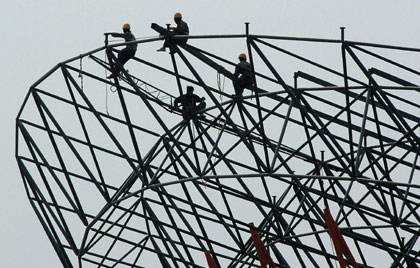WB: China's GDP to grow 9.5% in 2006
(AP)
Updated: 2006-05-10 16:18
China's sizzling economy will grow 9.5 percent this year, the World Bank said
in a forecast released Wednesday, up from its earlier figure of 9.2
percent.
That would be slightly lower than the 9.9 percent that China's
economy expanded last year.

Workers perch on a
steel structure at the construction site for a giant roof in Xiangfan,
central China's Hubei province April 24, 2006. The World Bank revised
China's forecast GDP growth for 2006 up to 9.5 percent.
[Reuters] |
The revision, contained in a quarterly
report on China's growth and government policies, was the second time the World
Bank has raised its forecast. It matched a 9.5 percent forecast issued earlier
by the Asian Development Bank.
The government's official growth target
is 8 percent. The economy expanded by 10.2 percent in the first three months of
this year, compared with the same period of 2005.
Beijing is trying to
discourage what it says is excessive investment in factories, luxury apartments
and other unneeded assets, which it says could lead to financial problems.
But the government is eager to continue strong growth in order to reduce
poverty, especially in rural China.
In February, the World Bank raised
its growth forecast of 8.7 percent for China after the government revised
economic data for previous years based on a nationwide survey.
The World
Bank also said it expects Beijing to let its currency, the yuan, rise in value
faster in order to curb excess liquidity in financial markets. It said that
might also help China to reduce its politically volatile current account
surplus.
The United States and other trading partners are pressing Beijing
to ease exchange-rate controls on the yuan and let it rise in value.
They contend the exchange rate is up to 40 percent too low and gives
Chinese exporters an unfair price advantage, hurting foreign competitors and
fueling a huge trade surplus.
|